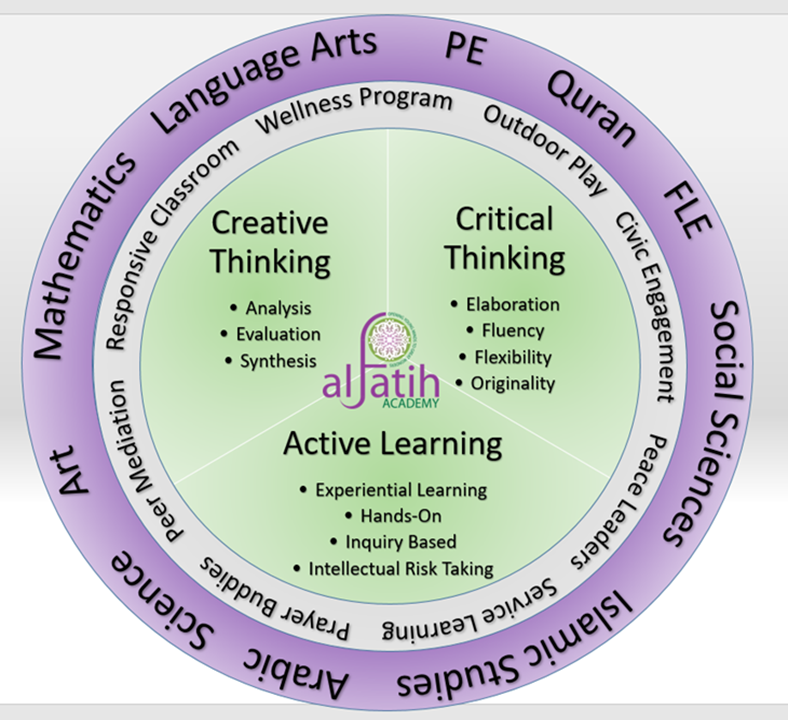The Al Fatih Approach
Integrated/Interdisciplinary Learning and Teaching
Since its inception 24 years ago, AFA has taken an integrated approach to teaching. AFA aims to guide students through an interdisciplinary curriculum integrating math, science, language, social studies, life skills, and Islamic/religious studies.
At AFA we believe the most lasting learning happens when it is connected to and pulled from actual surroundings where a student lives or learns. Place-based education (PBE) emphasizes and actively connects what is around the student as well as the historical, environmental, social and political elements of these surroundings. It can be as simple as knowing the classification of trees on the playground, cleaning the street, and understanding how the school’s neighborhood was created and changed over time through various impacts. It can also extend through field trips to local surrounding orchards, museums, nature trails, farms, etc. Our philosophy is a combination of various models including Gardner’s Theory of Multiple Intelligences and Marie Montessori’s methods that include instilling a sense of independence and discovery, respecting each student, and being intentional about the environment created for learning. Maslow’s Hierarchy of Needs as well as Bloom’s Taxonomy are also referenced to guide effective instruction.
American Muslim Identity
Islam in America should embody the concept of 'wenyējï,' which means 'something belonging here.' It must be indigenous, not in the sense of losing its identity through complete assimilation or becoming exclusive to native-born individuals, but in its original sense of being natural, envisioned, and arising from within. Regardless of their place of birth, Muslim Americans become indigenous when they truly feel a sense of belonging. The path to making Islam indigenous in America involves creating an integrated cultural identity that feels at ease with itself and harmoniously coexists with the surrounding world. - Dr. Umar Faruq Abd Allah, The Cultural Imperative 2004
According to the Pew Forum Survey in 2017, Muslim Americans overwhelmingly embrace both their 'Muslim' and 'American' identities, with a vast majority expressing pride in being American (92%) and in being Muslim (97%). A significant portion (89%) are proud of being both Muslim and American.
A thriving American Muslim identity goes beyond mere identification; as Dr. Abd Allah suggests, it should be nuanced, textured, and fully compatible with both aspects. In other words, this identity should be rooted in the context of a purposeful life within a culture.
At Al Fatih Academy, we embrace this understanding and assist students in developing dual identities that stay true to their cultural and religious foundations.
Cultural Literacy
Cultural Literacy means to understand and know a culture’s basic values, ideals, critiques of, and problematic considerations. Beyond just “must knows”, we believe at AFA that knowledge must be connected to student realities through history, trends, politics of our American culture and experiences. So when we are aware and involved in our country’s fabric and pulse, this helps us be a catalyst for social justice now and in the future.
What an AFA education looks like

